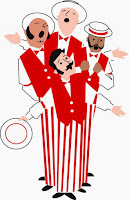A friend of mine [let’s call her Sally] went to a conference recently focusing on the problem of the aboriginals in today’s Canadian society. One of the highlights of the three-day event was a presentation of aboriginal dancing and drumming. One of the presenters explained to the audience the meaning of the colours of the feathers and other parts of their costumes. Oops, sorry….. he distinctly told them that what was being worn were not costumes, but rather regalia!
This prompted a further conversation with my husband about the clothing he had worn as part of a Barbershop group, which they had called uniforms.
 Now the barber-shoppers didn’t need to explain to anyone what their outfits stood for. That was obvious to everyone who saw them. They were a collegial group and their name was clearly visible. Even dressed in red and white striped coats with handle-bar moustaches and straw boaters, they were still identifiable as belonging to the Barbershop movement with started in the 1938. People understood that the red and white strips in the shirts referred to the red and white striped barber poles that we still can see outside some shops.
Now the barber-shoppers didn’t need to explain to anyone what their outfits stood for. That was obvious to everyone who saw them. They were a collegial group and their name was clearly visible. Even dressed in red and white striped coats with handle-bar moustaches and straw boaters, they were still identifiable as belonging to the Barbershop movement with started in the 1938. People understood that the red and white strips in the shirts referred to the red and white striped barber poles that we still can see outside some shops.
The outfits of the aboriginals are immediately recognizable as being the ceremonial dress of their ancestors. While we may know the names of the different pieces of clothing, the meaning of the colours, bead designs and feathers is not part of our everyday knowledge. Hence the need for their leader to explain the regalia to his audience so that they could more deeply appreciate the presentation.
Costumes are worn on Hallowe’en when we dress up as something we are not. Both of these groups were using what they wore to identify who they were, with differing degrees of success.
 Another group that comes immediately to mind is the clergy, especially those of the Anglican, Roman Catholic and Lutheran denominations. The robes worn by these clergy have their origins in third-century everyday garb, and have long since lost their meaning for contemporary audiences. Instead they place a barrier between the ordained and the lay members of those churches. Ministers or pastors of most denominations wear a white clerical collar. This started in the 1840 according to Wikipedia: “By 1840, Anglican clergy developed a sense of separation between themselves and the secular world. One outward symbol of this was the adoption of distinctive clerical dress… By the 1880s this had been transmuted into the clerical collar, which was worn almost constantly by the majority of clergy for the rest of the period.”
Another group that comes immediately to mind is the clergy, especially those of the Anglican, Roman Catholic and Lutheran denominations. The robes worn by these clergy have their origins in third-century everyday garb, and have long since lost their meaning for contemporary audiences. Instead they place a barrier between the ordained and the lay members of those churches. Ministers or pastors of most denominations wear a white clerical collar. This started in the 1840 according to Wikipedia: “By 1840, Anglican clergy developed a sense of separation between themselves and the secular world. One outward symbol of this was the adoption of distinctive clerical dress… By the 1880s this had been transmuted into the clerical collar, which was worn almost constantly by the majority of clergy for the rest of the period.”
I find interesting that the initial reason for the wearing of clerical collars was to announce a separation from the secular world. Surely this is outmoded in the 21st century. To quote Mother Teresa:“Go out into the world today and love the people you meet. Let your presence light new light in the hearts of people.”
Separation and love have trouble co-existing!
Separation and love have trouble co-existing!


Comments
Post a Comment